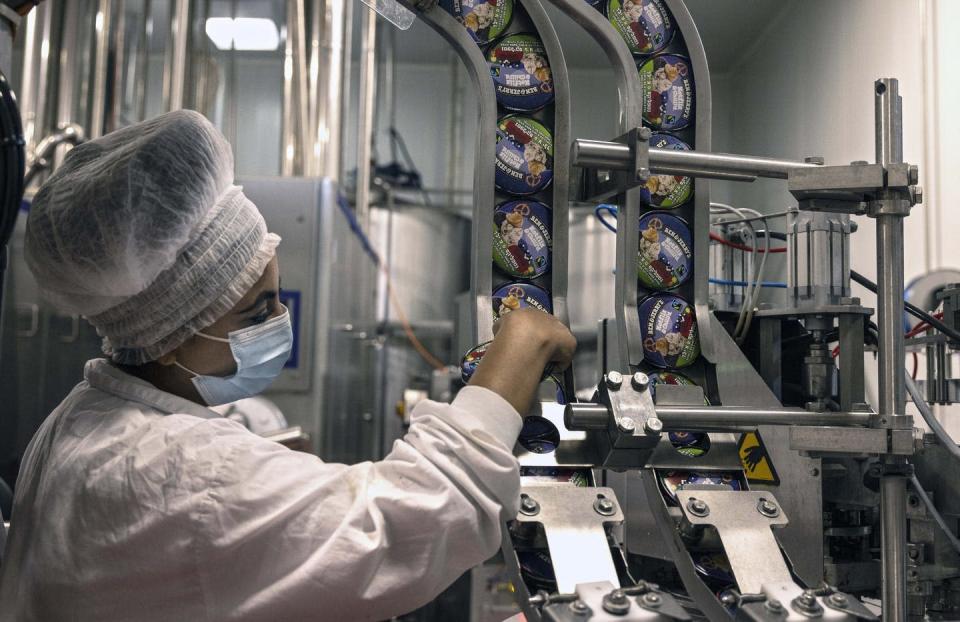Why Ben & Jerry’s decision to stop selling ice cream in the West Bank rattled Israel

Israelis have long had a sweet tooth for Ben & Jerry’s. AP Photo/Tsafrir Abayov
Ronnie Olesker
Associate Professor of Government, St. Lawrence University
In 2018, I was living in Israel while researching a book about the country’s fight against groups that challenge its legitimacy.
Every Wednesday, a new batch of Ben & Jerry’s ice cream arrived at my local supermarket, and I would snap up as many tubs of vanilla as I could. By Thursday, there’d be none left. Clearly, Israelis love their Ben & Jerry’s – which makes up about 75% of the premium ice cream market in Israel.
Still, even I was surprised by the ferocity of the Israeli reaction to Ben & Jerry’s announcement on July 19, 2021, that it would no longer sell its ice cream in Palestinian territories occupied by Israel. Many Israelis on my social media feed were outraged. Politicians condemned Ben & Jerry’s as “anti-Israel” and urged American lawmakers to sanction the South Burlington, Vermont-based company. Some states are already preparing to do just that.
Could it be that the boycott, divestment and sanctions movement – which targets the Israeli occupation of the West Bank and Gaza – has finally found Israel’s soft spot?
What is the BDS movement?
The boycott, divestment and sanctions movement, known as the BDS movement, began in 2005. That’s when 170 Palestinian civil society organizations called for an economic, cultural and academic boycott of Israel for its violation of international law and Palestinian rights, as well as its occupation of the West Bank and Gaza.
The movement, which soon included a loose network of activists based all around the world, also urged companies, universities and others to divest from Israel and countries to sanction it.
Inspired by the success of the global movement to end apartheid in South Africa, the BDS campaign seeks to enlist academics, countries, companies and others in its effort to punish and isolate Israel. Its biggest gains so far have been in getting some academic groups and churches to support its boycott.

protests against South Africa in the 1980s. AP Photo/Oded Balilty
Minimal impact on Israel
But the BDS movement appears to have had little impact on Israel’s economy or its diplomatic standing.
One reason for this is that Israel has faced boycotts since before it even became a state in 1948. As a result, its economy has become adept at producing high-quality, cutting-edge and specialized products for export, making boycotts less effective because trade partners can’t easily substitute goods from other countries.
Israel has also successfully lobbied some countries and lawmakers to condemn boycotts against it. In 2019, for example, the German Parliament designated the BDS movement as antisemitic. And U.K. Prime Minister Boris Johnson’s government has said it plans to pass a measure to curb boycotts against Israel.
In the U.S., some are boycotting the boycotters. Thirty-five states have passed anti-BDS laws, executive orders and resolutions since 2005. These typically limit state authorities from doing business with anyone who is actively boycotting Israel and prevent state pension funds from investing in BDS-linked companies. Officials in Florida and Texas have already threatened to add Unilever, Ben & Jerry’s parent company, to a blacklist of businesses that are ineligible for investments.
One of the main reasons why the anti-apartheid movement succeeded in isolating South Africa in the 1980s is that it convinced major companies, such as Coca-Cola, Pepsi-Co, Reebok and Ford, to stop doing business with the country.
While French telecom group Orange ended its licensing agreement with an Israeli company in 2016, few other big companies have embraced the movement. In 2018, Airbnb said it would remove the listings of properties in Israeli settlements, but reversed itself a few months later after a flurry of anti-discrimination lawsuits were filed against it.
But despite the lack of substantive economic or diplomatic impact, I believe it would be a mistake to label the BDS movement as a failure. Rather, Ben & Jerry’s decision hints at a watershed moment in the BDS campaign.

Shifting views of Israel
The company, founded by Jewish friends Ben Cohen and Jerry Greenfield in 1978, has long embraced a liberal social mission – which it frequently expresses through its ice cream flavors, such as Save Our Swirled and Justice ReMix’d. Even after Unilever bought the company in 2000, Ben & Jerry’s remained independent in pursuing its progressive values.
In its statement announcing the shift, Ben & Jerry’s said selling ice cream in the West Bank and Gaza “is inconsistent with our values.” Cohen and Greenfield defended the company’s decision in an op-ed in The New York Times on July 28, 2021.
While I don’t doubt the company’s values were behind the decision, I also believe something else was at work: Israel is losing the battle for public opinion.
Israel currently has a net favorability of just 3% among Democrats and voters who lean Democratic, down from 31% in the early 2000s. Among liberal Democrats, Israel has a net unfavorability of 15%, as more of these voters express support for Palestinians. The trend is especially strong with younger Americans, who are much less supportive than their older counterparts.
A separate 2019 poll found that, although most Americans had never heard about the BDS movement, 48% of Democrats who were familiar with it said they support it. And almost three-quarters of all respondents of that survey said they opposed laws that punish people for engaging in a boycott.
During the anti-apartheid fight, big companies didn’t join the movement until public opinion began to seriously shift in response to vibrant grassroots activism, typically led by college students.
Ben & Jerry’s has faced a similar campaign from pro-Palestinian activists for years. The fighting in Gaza in May 2021 that left 253 Palestinians and 12 Israelis dead seems to have accelerated the pressure as social media activists bombarded the company with demands to boycott Israel. This prompted a 20-day silence by Ben & Jerry’s on social media, followed by the new policy just a few weeks later.

Shared values
In other words, public sentiment among a group of U.S. voters – including many American Jews – who used to be stalwart supporters of Israel has shifted, and they are increasingly turning their backs on the Jewish state.
For instance, while most Americans support a two-state solution that separates Israel from the Palestinian territories it occupies, the Israeli government and its citizens increasingly do not distinguish between Israel and the territories it has occupied since 1967.
The rhetoric of Israeli politicians condemning companies like Ben & Jerry’s that join the boycott of settlements – such as calling it a form of antisemitism or equating it with terrorism – makes the problem worse. In my own research, I found that it validates and perpetuates the illiberal image of Israel that the BDS movement paints.
In an interview in January, Christopher Miller, Ben & Jerry’s head of global activism strategy, said the “strongest bond you can create with customers is around a shared set of values.”
That’s why I belThat’s why I believe Ben & Jerry’s is likely to stay the course – and why more American companies will follow suit.
Republished with permission from TheConversation under Commons License


